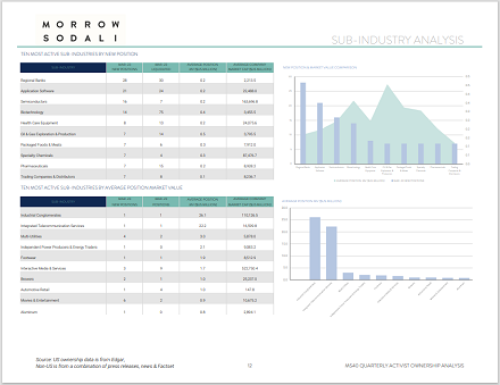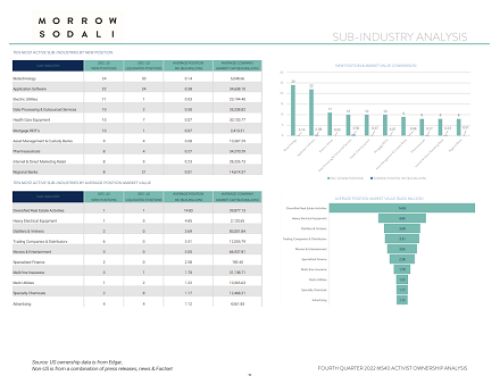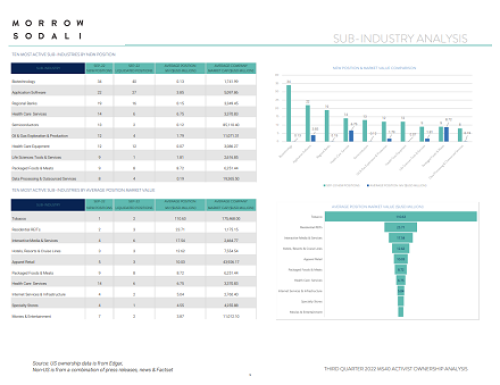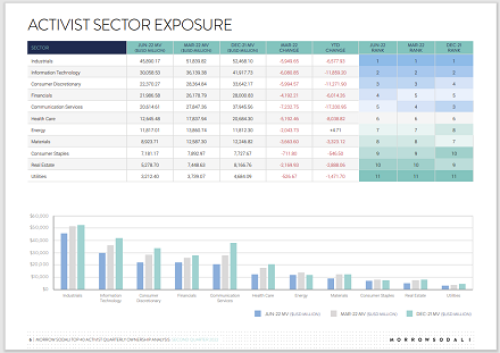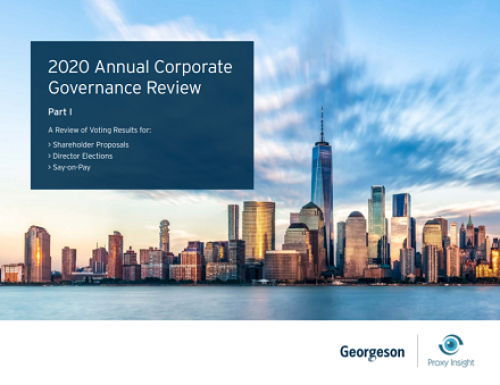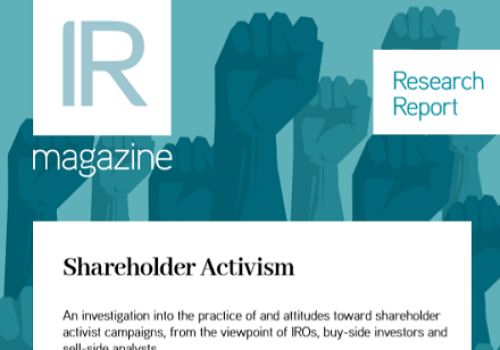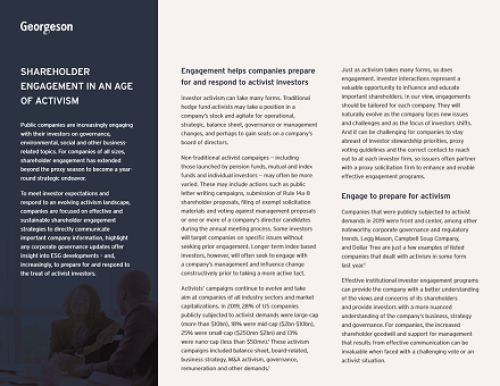A look at how activism evolved in the US and elsewhere over the past year
Olshan Frome Wolosky has topped Activist Insight Monthly’s league table for law firms representing activists for the second year running, working on 57 campaigns in the 11 months to December 2016. IR Magazine caught up with Steve Wolosky, Andrew Freedman and Ron Berenblat of Olshan’s activist & equity investment group, to get their insights on shareholder activism in 2016.
This article is the first in a three-part series. Click here to read Olshan’s look ahead at activism in 2017 and Olshan’s views on the SEC’s universal proxy proposal.
Steve Wolosky, Andrew Freedman and Ron Berenblat:
‘Last year was another very strong year for shareholder activism in the US in terms of sheer volume and its significant impact on board composition, M&A activity and the governance, operational and strategic decisions made by boards of affected target companies. Activists also continued to push the boundaries in which they operate to jurisdictions outside the US – particularly in Europe and Asia, where we believe US-style activist campaigns are beginning to gain traction.
US activism
‘According to FactSet, US companies were the subject of 520 activist campaigns during 2016. We continued to see all forms of shareholder advocacy being pursued in the space, but what activists desired most was a seat on the board.
‘Consistent with prior years, while there is evidence that boards were more willing to take an election contest to a vote in 2016 than in prior years, most activist situations culminated with a settlement resulting in board representation for the activist, reflecting the general consensus that reaching a settlement in order to avoid the expense and distraction of a proxy fight is a win-win for all parties involved. Our firm alone advised on 48 settlements, resulting in the appointment of approximately 65 directors during 2016.
‘Proxy contests and settlements of various activist situations involving long-time activists and newcomers alike pressing companies to strengthen their balance sheets, improve operations, adopt corporate governance reform or explore strategic alternatives made headlines throughout 2016. Starboard Value kicked off 2016 with the first settlement agreement of the year with the Brink’s Company, which resulted in the appointment of three new independent directors to the board and was followed by the early retirement of its CEO.
‘Seasoned activist Engaged Capital had a busy year, entering into an agreement with HeartWare International to jointly select a new independent director following the termination of the company’s proposed acquisition of Valtech Cardio, a transaction Engaged Capital publicly opposed. It also entered into an agreement with Outerwall (owner of Redbox DVD rentals) for board representation, and won two board seats at Benchmark Electronics’ annual meeting by a significant margin.
‘CST Brands entered into settlements simultaneously with two activists, JCP Investment Management and Engine Capital, agreeing to appoint new independent directors and initiate a strategic alternatives review process.
‘In the M&A sphere, this area of activism led to the monetization of assets or outright sale of various well-known target companies during 2016. Elliott Management was particularly adept in its M&A activism strategy during the past year with a victory in the form of Cabela’s October announcement that it would be acquired by Bass Pro Shops for approximately $5.5 bn in cash [though the deal is currently facing scrutiny from the US Federal Trade Commission].
‘Just three months after Elliott Management filed a Schedule 13D on Qlik Technologies stating that it had initiated discussions with the company regarding strategic and operational opportunities, Qlik announced in June 2016 that it would be acquired by Thoma Bravo for approximately $3 bn in cash. Similarly, less than five months after Elliott Management filed a Schedule 13D on LifeLock, the company announced in November 2016 that it would be acquired by Symantec to form the world’s largest consumer security business.
‘But 2016 saw fewer ‘high-profile’ activist campaigns against mega-cap companies compared with 2015. Instead, many activists shifted their focus to small to mid-cap companies, which in the early years of the activism cycle represented the sweet spot of the activism space. That isn’t to say there weren’t some blockbuster campaigns waged, however.
‘One such example was Starboard Value’s engagement with Yahoo. Under a settlement agreement reached in April 2016, four Starboard Value nominees, including principal Jeff Smith, were appointed to the Yahoo board and the company agreed to appoint Smith to the strategic review committee. Just three months later, Yahoo announced that its operating business would be acquired by Verizon Communications for $4.8 bn in cash.
Activism around the world
‘As the number of participants in the activism arena has increased and competition for targets in the US has grown fierce, activists ramped up their efforts to identify targets elsewhere during 2016. Activists who had historically been reluctant to mount campaigns in non-US jurisdictions due to their lack of familiarity with foreign laws and the uncertainty associated with local proxy voting customs and mechanics were more willing to take the plunge into global activism. According to Activist Insight Online, during the 11-month period ending November 30, 2016, companies outside the US that were publicly the subject of activist demands increased to 287 from 230 over the comparable period in 2015.
‘In the UK, ValueAct Capital Management’s engagement with Rolls-Royce Holdings during 2016 led to the country’s first activist situation where a US-style settlement agreement was used to grant an activist board representation in exchange for a standstill. After ValueAct disclosed a more than 5 percent position in Rolls-Royce in July 2015, the British multinational announced that it had engaged in ‘constructive discussions with ValueAct over recent days and welcome it as an investor that recognizes the long-term value of our business.’
‘Shortly thereafter, amid media reports that ValueAct would like to see cost-cutting initiatives and possibly a sale of the non-aerospace businesses, and that it was working behind the scenes to obtain a board seat, ValueAct doubled its position in Rolls-Royce, becoming the largest shareholder. In March 2016 the parties entered into a relationship agreement under which Rolls-Royce agreed to appoint Bradley Singer, a principal of ValueAct, to the board and recommend Singer or another ValueAct designee for election at the 2016 and 2017 AGMs. ValueAct agreed to a standstill until the 2018 AGM.
‘We believe the Rolls-Royce situation could lead the way for more behind-the-scenes activism and the use of more US-style settlement agreements to resolve election contests in the UK.
‘In Japan, Prime Minister Shinzo Abe’s ‘Third Arrow’ reforms are causing companies to improve corporate governance and focus on shareholder interests, which attracted activists to the country during 2016. In March, Dan Loeb of Third Point sent an open letter to Seven & i Holdings (7&I) expressing concerns that long-time chairman and CEO Toshifumi Suzuki had planned to install his son as the next president of the Seven-Eleven Japan subsidiary and eventually the parent company.
‘Loeb criticized 7&I’s succession plan and warned that he will not tolerate nepotism in determining the company’s future leadership. He said Ryuichi Isaka, the then-president of Seven-Eleven Japan who had overseen record profits at the subsidiary, was a natural candidate to become CEO of the parent company. Shortly thereafter, Suzuki resigned after failing to obtain the requisite majority vote at a board meeting to replace Isaka at Seven-Eleven Japan with Suzuki’s son. 7&I then promoted Isaka to president of the parent company, beginning a new era of leadership after four decades under Suzuki.
‘The 7&I situation exemplifies an improving activism landscape in Japan with boards appearing to be more receptive to less aggressive approaches by activists.
‘In Germany, Active Ownership Capital was successful in replacing the chairman of the supervisory board of pharmaceuticals firm STADA Arzneimittel at its 2016 AGM. Active Ownership sought to replace multiple members of the supervisory board despite the conventional view that German boards are hopelessly entrenched due to their mandatory two-tier structure.
‘Active Ownership exercised its rights under German corporate law to nominate a competing slate of directors for election at the AGM and submit business proposals seeking to remove and replace directors at the meeting. While it was successful in replacing only the chairman of the supervisory board, this was considered to be a significant victory for activists given how rare election contests are in Germany.’


